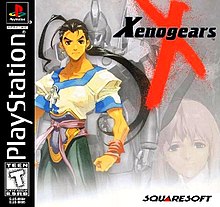
Back زينوجيرس Arabic زينوجيرس ARZ Xenogears German Xenogears Spanish Xenogears French Xenogears ID Xenogears Italian ゼノギアス Japanese 제노기어스 Korean Xenogears LLD
| Xenogears | |
|---|---|
 North American box art | |
| Developer(s) | Square Product Development Division 3[1] |
| Publisher(s) | |
| Director(s) | Tetsuya Takahashi |
| Producer(s) | Hiromichi Tanaka |
| Programmer(s) | Kiyoshi Yoshii |
| Artist(s) | Kunihiko Tanaka Yasuyuki Honne |
| Writer(s) | Tetsuya Takahashi Kaori Tanaka Masato Kato |
| Composer(s) | Yasunori Mitsuda |
| Platform(s) | PlayStation |
| Release | |
| Genre(s) | Role-playing |
| Mode(s) | Single-player, multiplayer |
Xenogears[a] is a 1998 role-playing video game developed and published by Square for the PlayStation video game console. It is the debut entry in the larger Xeno franchise. The gameplay of Xenogears revolves around navigating 3D environments both on-foot and using humanoid mecha dubbed "Gears". Combat is governed by a version of the turn-based "Active Time Battle" system. The story follows protagonist Fei Fong Wong and several others as they journey across the world to overthrow the all-powerful rule of Solaris and uncover mysteries concerning their world. The story incorporates Jungian psychology, Freudian thought, and religious symbolism.
Created by Tetsuya Takahashi and his wife Kaori Tanaka as a proposal for Final Fantasy VII, it was allowed to be developed as its own project; first as a sequel to Chrono Trigger and then as an original game with a science fiction premise. It was developed under the working title "Project Noah". The characters were designed by Kunihiko Tanaka, while the gears were designed by Junya Ishigaki and Yoshinori Ogura. The designs were portrayed during in-game cinematics through the use of anime cutscenes. Due to time constraints and the team's general inexperience, the second half of the game's plot was primarily told through cutscenes.
The game was almost not localized due to its religious content; its localization was handled by Square Electronic Arts staff and translator Richard Honeywood, who described it as one of the most troublesome games of his career. Xenogears received critical acclaim, with many calling it a work of art due to its heavy religious themes and elements of Jungian psychology. Praises particularly went towards the storyline, gameplay, characters, and psychological and religious themes, but received criticism for the rushed pace of the second disc, due to a lack of gameplay and excessive narration. By 2003, the game had shipped 1.19 million copies worldwide, gaining a cult following. While a direct sequel has not been developed, Takahashi would later found Monolith Soft and develop the Xenosaga trilogy and Xenoblade Chronicles games as spiritual successors.
- ^ "Interviews". Archived from the original on February 13, 2009. Retrieved March 16, 2010.
Richard Honeywood: From day one. The Product Development Division-3 team and I were just finishing off the North American version of Chrono Cross when talk of making an online version of Final Fantasy first came up. As I had also worked with Division-3 on Xenogears before that as well, it seemed only natural I help them out on their next project...
Cite error: There are <ref group=lower-alpha> tags or {{efn}} templates on this page, but the references will not show without a {{reflist|group=lower-alpha}} template or {{notelist}} template (see the help page).
© MMXXIII Rich X Search. We shall prevail. All rights reserved. Rich X Search